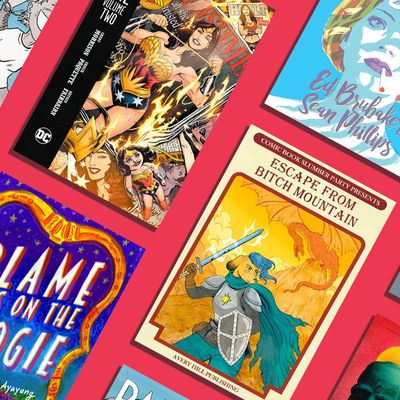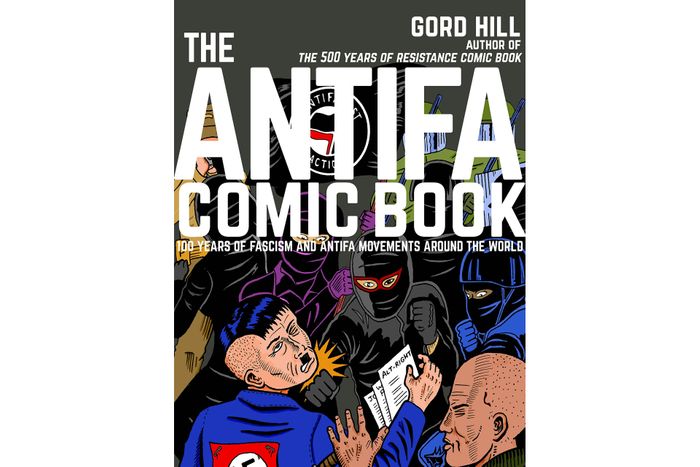
Each month, Abraham Riesman offers recommendations of comics media, including book-length graphic novels, comics-format nonfiction, ongoing series, and comics-related items in other forms. With any luck, at least one of them will be a match for you. Check out October’s recommendations here.
Upgrade Soul, by Ezra Claytan Daniels (Lion Forge)
Upgrade Soul is one of those sci-fi stories that starts with a premise you’d think could only fill a short story, then explores every nook and cranny of it in such attentive detail that the length of a novel hardly feels adequate to contain it. In Ezra Claytan Daniels’s masterfully crafted narrative, an elderly couple — a scientist and a sci-fi author, respectively — wakes up one day to find they’ve been transplanted into eerie new bodies that look like protoplasmic potatoes, wondering how they ended up in such an unfortunate situation. I’ve already said too much and I’m loath to tell you anything more, for the story is so full of bizarre surprises that I don’t want you to miss out on the full impact of a single one. Suffice it to say that the book ends up being a meditation on identity and our unending quest for personal perfection and satisfaction at any costs. Daniels’s prose is haunting and cinematic, and his storytelling structure is magnificent, but his greatest talents lie in his artwork, which uses thin lines and surreal imagination to mix beauty and deformity to a point where the two are indistinguishable from one another.
Blame This on the Boogie, by Rina Ayuyang (Drawn + Quarterly)
Blame This on the Boogie barely has a through-line, but I’m not complaining. This graphic memoir from Rina Ayuyang sorta centers around the author’s lifelong love of dance, but it works primarily as a charmingly scattershot series of observations and vignettes about her years on this earth. Adopting a subtle variety of art and material styles that range from explosive crayon to graceful marker, Ayuyang chronicles her childhood as the daughter of Filipino immigrants, during which she was obsessed with Fred Astaire and Ginger Rogers; then leaps ahead to her adult life, dwelling on her roles as a mother and a comics creator, as well as a Dancing with the Stars superfan. The book feels like it has ADD, but the manic energy of the storytelling syncs perfectly with that of the visuals, adding up to a satisfyingly all-over-the-place reading experience.
Part of It: Comics and Confessions, by Ariel Schrag (Mariner)
There’s a story in the middle of Ariel Schrag’s Part of It that I can’t stop thinking about. It deals with a period in the author’s mid-20s when she needed to get a new pair of glasses and had difficulty deciding which frames to choose, which should be an extremely dull bit of self-indulgent autobiography. Add to that the fact that it takes up two dozen pages and it should be unbearable. And yet, Schrag is an expert personal storyteller and uses that space to chronicle a neurotic obsession with optimizing her life and hating its imperfectability — leaving you both furious with her for her indecisiveness and empathic toward her struggle to accept herself. That level of emotive self-observation is on display throughout this collection of pieces of memoir, which takes us from an early-childhood session of make-believe rape with her best friend, to a period of attempting to teach sex-ed and drama to complicated schoolgirls, to a blissfully stoned walk on Venice Beach, and beyond. The elegantly slender-lined visual style is deceptively simple, gradually revealing Schrag’s ability to command emotion with her pen in the same way she does with her words.
My Heroes Have Always Been Junkies, by Ed Brubaker, Sean Phillips, and Jacob Phillips (Image)
My Heroes Have Always Been Junkies is that rarest of noir stories: one in which the femme fatale takes center stage. In it, we meet a young woman named Ellie, who’s wound up in a swanky rehab facility alongside a collection of personalities ranging from the earnest to the blatantly untruthful. But where does she fit in on that spectrum? When she strikes up a friendship with a teenage boy in the facility, we learn that she contains more secrets than a car-trunk full of horse. All the while, we get glimpses of her obsession with history’s great drug-addicted artists, whom she idolizes to a fault. Ed Brubaker is firing on all cylinders with Ellie’s narration and her compatriots’ dialogue, and his longtime collaborators Sean and Jacob Phillips conjure up a sun-baked world of self-deluded chumps whom you’ll instantly recognize from looking in the mirror.
The Antifa Comic Book, by Gord Hill (Arsenal Pulp Press)
English-language sequential art has a long history of anti-fascist work, running from the pulpy Hitler-socking of Joe Simon and Jack Kirby’s Captain America to the unsettling meditations of Art Spiegelman’s Maus. That said, we haven’t seen a lot of good old-fashioned anti-fascist propaganda comics since the U.S. Army stopped handing them out to GIs after V-E Day. That is changing with the advent of The Antifa Comic Book, a delightful bit of agitprop from leftist cartoonist Gord Hill. It’s primarily a history lesson, diving into the rise of and resistance to fascist movements throughout the West, from that of Mussolini to that of the alt-right with charmingly simplistic imagery (intelligent people may disagree with Hill’s identification of certain rightist groups as actual, literal fascists, but that’s somewhat beside the point). It’s a bit curious that the book doesn’t delve into fascism outside of Europe and North America, but Hill’s doing the Lord’s work, so you can’t complain too much. Unless you’re a fascist, that is. In which case: choke on it, Nazi scum.
Escape From Bitch Mountain, edited by Hannah K. Chapman (Avery Hill)
Escape From Bitch Mountain is the work of a comics collective known as Comic Book Slumber Party, and the wild, giggly energy of the finished product lives up to the group’s moniker. In this brisk bit of ludicrous comedy, a T-shirt clad dog-woman warrior named Greasy wakes up after a wild night of drinking and ventures through a Dungeons & Dragons-esque fantasy world on a mission of glory and conquest. Each stage of her journey is crafted by a different creator or team of artists, and though the range of styles is dizzying, everyone involved has a profound gift for verbal and visual comedy, goading you into chuckles at the sugar-rush giddiness of the whole endeavor.
Mr. and Mrs. X, by Kelly Thompson, Oscar Bazaldua, Frank D’Armata, and Joe Sabino (Marvel)
Like a “23 Things Only ’90s Kids Will Get” listicle, Mr. and Mrs. X is perfectly optimized for superhero-fiction fans who came of age during the Clinton administration. It’s a chronicle of the ongoing adventures of that all-time great X-Men couple, country-fried Rogue and Cajun-spiced Gambit. Having recently tied the knot after decades of will-they-or-won’t-they, the pair ventures into space for their honeymoon, only to find themselves running afoul of the Shi’ar Imperium (you’d think X-people would have learned by now that that’s more or less of an inevitability when leaving Earth’s orbit), crossing paths with Deadpool, and just generally getting into sci-fi-ified trouble. Veteran color artist Frank D’Armata and relative-unknown penciller Oscar Bazaldua prove to be a formidable art team, capturing the whiz-bang of a world beyond the stars, and I swear to God, I don’t know how writer Kelly Thompson is juggling as many books as she is right now and pulling them all off so damn well. If you’re as big of an X-geek as she is, you’ll have a space-whale of a time.
Wonder Woman: Earth One, Vol. 2, by Grant Morrison, Yanick Paquette, Nathan Fairbairn, and Todd Klein (DC)
The Wonder Woman legendarium was not built on political subtlety. The character’s progenitor, William Moulton Marston (though we should never forget her co-creator, artist H.G. Peter), was a proud wielder of a blunt form of feminism, declaring that the world should be (a) run by women and (b) filled with all manner of BDSM kinkiness. Masterminds Grant Morrison and Yanick Paquette uphold that tradition of no-holds-barred ideological storytelling in the second volume of their clean-slate reimagining of the W.W. mythos, Wonder Woman: Earth One. Though the first volume was a fun yarn, the sophomore effort outstrips it in terms of ambition and delight, telling a tale in which Diana and the Amazons struggle against the twin demonic influences of Nazis and pick-up artists. Morrison never truly disappoints any time he sits at his typewriter, but the real action here is in Paquette and color artist Nathan Fairbairn’s truly stunning imagery, which plays around with the very notion of what constitutes a comics panel and paints us a feminine paradise that seems as though it’s only a gentle caress away.









